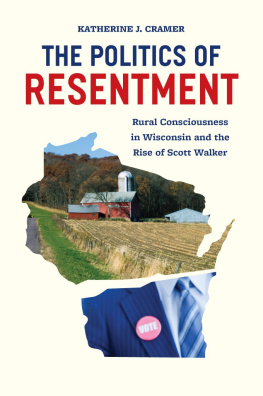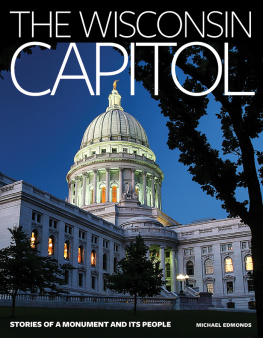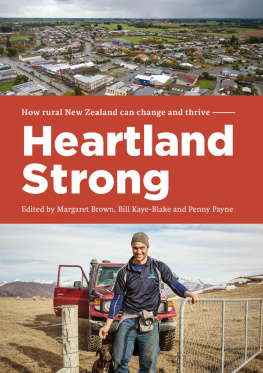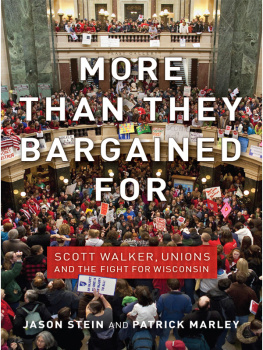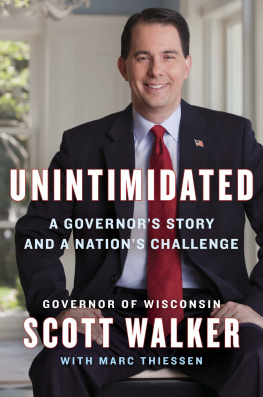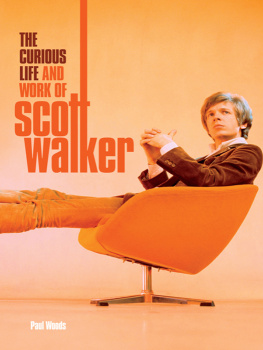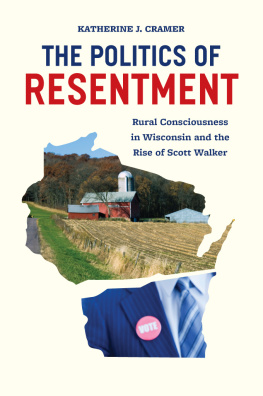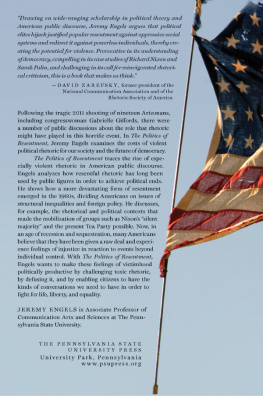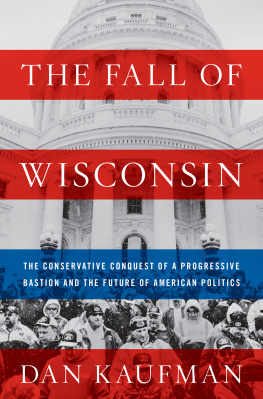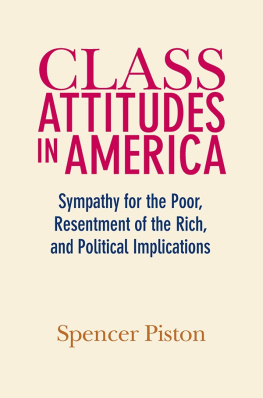The Politics of Resentment
Chicago Studies in American Politics
A series edited by Benjamin I. Page, Susan Herbst, Lawrence R. Jacobs, and Adam J. Berinsky
Also in the series:
Legislating in the Dark: Information and Power in the House of Representatives by James M. Curry
Why Washington Wont Work: Polarization, Political Trust, and the Governing Crisis by Marc J. Hetherington and Thomas J. Rudolph
Who Governs? Presidents, Public Opinion and Manipulation by James N. Druckman and Lawrence R. Jacobs
Trapped in Americas Safety Net: One Familys Struggle by Andrea Louise Campbell
Arresting Citizenship: The Democratic Consequences of American Crime Control by Amy E. Lerman and Vesla M. Weaver
How the States Shaped the Nation: American Electoral Institutions and Voter Turnout, 19202000 by Melanie Jean Springer
The American Warfare State: The Domestic Politics of Military Spending by Rebecca U. Thorpe
Changing Minds or Changing Channels? Partisan News in an Age of Choice by Kevin Arceneaux and Martin Johnson
Trading Democracy for Justice: Criminal Convictions and the Decline of Neighborhood Political Participation by Traci Burch
White-Collar Government: The Hidden Role of Class in Economic Policy Making by Nicholas Carnes
How Partisan Media Polarize America by Matthew Levendusky
The Politics of Belonging: Race, Public Opinion, and Immigration by Natalie Masuoka and Jane Junn
Political Tone: How Leaders Talk and Why by Roderick P. Hart, Jay P. Childers, and Colene J. Lind
The Timeline of Presidential Elections: How Campaigns Do (and Do Not) Matter by Robert S. Erikson and Christopher Wlezien
Learning while Governing: Expertise and Accountability in the Executive Branch by Sean Gailmard and John W. Patty
Electing Judges: The Surprising Effects of Campaigning on Judicial Legitimacy by James L. Gibson
Follow the Leader? How Voters Respond to Politicians Policies and Performance by Gabriel S. Lenz
The Social Citizen: Peer Networks and Political Behavior by Betsy Sinclair
The Submerged State: How Invisible Government Policies Undermine American Democracy by Suzanne Mettler
Disciplining the Poor: Neoliberal Paternalism and the Persistent Power of Race by Joe Soss, Richard C. Fording, and Sanford F. Schram
Why Parties? A Second Look by John H. Aldrich
News That Matters: Television and American Opinion, Updated Edition by Shanto Iyengar and Donald R. Kinder
Selling Fear: Counterterrorism, the Media, and Public Opinion by Brigitte L. Nacos, Yaeli Bloch-Elkon, and Robert Y. Shapiro
Obamas Race: The 2008 Election and the Dream of a Post-Racial America by Michael Tesler and David O. Sears
Filibustering: A Political History of Obstruction in the House and Senate by Gregory Koger
In Time of War: Understanding American Public Opinion from World War II to Iraq by Adam J. Berinsky
Us against Them: Ethnocentric Foundations of American Opinion by Donald R. Kinder and Cindy D. Kam
The Partisan Sort: How Liberals Became Democrats and Conservatives Became Republicans by Matthew Levendusky
Democracy at Risk: How Terrorist Threats Affect the Public by Jennifer L. Merolla and Elizabeth J. Zechmeister
Agendas and Instability in American Politics, Second Edition by Frank R. Baumgartner and Bryan D. Jones
The Private Abuse of the Public Interest by Lawrence D. Brown and Lawrence R. Jacobs
The Party Decides: Presidential Nominations Before and After Reform by Marty Cohen, David Karol, Hans Noel, and John Zaller
Same Sex, Different Politics: Success and Failure in the Struggles over Gay Rights by Gary Mucciaroni
The Politics of Resentment
Rural Consciousness in Wisconsin and the Rise of Scott Walker
KATHERINE J. CRAMER
THE UNIVERSITY OF CHICAGO PRESS
CHICAGO & LONDON
KATHERINE J. CRAMER is professor of political science at the University of WisconsinMadison, where she is also director of the Morgridge Center for Public Service and an affiliate faculty member in the School of Journalism and Mass Communication, the LaFollette School of Public Affairs, the Department of Forest and Wildlife Ecology, the Wisconsin Center for the Advancement of Postsecondary Education, and the Center for Community and Nonprofit Studies. She is the author of Talking about Race and Talking about Politics, both also published by the University of Chicago Press.
The University of Chicago Press, Chicago 60637
The University of Chicago Press, Ltd., London
2016 by The University of Chicago
All rights reserved. Published 2016.
Printed in the United States of America
25 24 23 22 21 20 19 18 17 16 1 2 3 4 5
ISBN -13: 978-0-226-34908-4 (cloth)
ISBN -13: 978-0-226-34911-4 (paper)
ISBN -13: 978-0-226-34925-1 (e-book)
DOI : 10.7208/chicago/9780226349251.001.0001
Library of Congress Cataloging-in-Publication Data
Cramer, Katherine J. (Katherine Jean), author.
The politics of resentment : rural consciousness in Wisconsin and the rise of Scott Walker / Katherine J. Cramer.
pages cm(Chicago studies in American politics)
ISBN 978-0-226-34908-4 (cloth : alkaline paper) ISBN 978-0-226-34911-4 (paperback : alkaline paper) ISBN (978-0-226-34925-1 (e-book) 1. WisconsinPolitics and government21st century. 2. Walker, Scott (Scott Kevin), 19673. Rural-urban divideWisconsin. I. Title. II. Series: Chicago studies in American politics.
F 586.2. C 73 2016
977.5044dc23
2015025701
This paper meets the requirements of ANSI / NISO Z 39.481992 (Permanence of Paper).
To Rosemary
Contents
Knowledge is something we often create with other people, and that is the case with this book. My gratitude extends far beyond these pages and into the future. But its my pleasure to spell it out as best as I am able here.
First and foremost, I am deeply grateful to the people who allowed me access to their conversations for this study. I do not take it lightly that you allowed a stranger to sit with you in spaces you have carved out for yourselves as havens. Your hospitality, good humor, and honesty are sticking with me.
Secondly, I am grateful to the many University of WisconsinMadison (UWMadison) students who helped me with this project. Tim Bagshaw, Emily Erwin-Frank, David Lassen, Ryan Miller, Tricia Olsen, Helen Osborn, Kerry Ratigan, and Paula Uniacke helped with transcription, translation, and gathering census and other background data. Special thanks to Dave Lassen for his excellent work on the news media content-analysis project in . Also, Sarah Niebler spent many months on crucial analyses that helped me understand the lay of the land in terms of partisan leanings and distribution of resources in Wisconsin and across the country. Ben Toff, thank you for your assistance with so many aspects of this book, including the many long and valuable conversations. Thank you also to the participants in the American Politics Workshop and the Political Behavior Research Group at UWMadison.
I had the pleasure of presenting various aspects of this work to many groups, and I am grateful to you all for the invitations to do so. Thank you to the members of the Center for the Study of Democratic Politics colloquium at Princeton University, the Center for American Political Studies at Harvard University, the Department of Political Science at the University of Illinois at Urbana-Champaign, the Center for Political Studies at the University of Michigan, the Chicago Area Political and Social Behavior Workshop at Northwestern University, the Center for the Study of Democratic Institutions at Vanderbilt University, the Center on American Politics at Indiana University, the American Politics Workshop at the University of Chicago, the Cornell Conference Homogeneity and Heterogeneity in Public Opinion, and also the Oxford conference Popular Reactions to the Economic Crisis.

